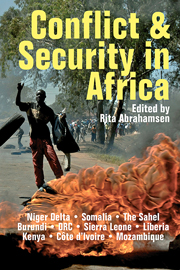
-
Select format
-
- Publisher:
- Boydell & Brewer
- Publication date:
- October 2013
- September 2013
- ISBN:
- 9781782041641
- 9781847010780
- Dimensions:
- Weight & Pages:
- Dimensions:
- Weight & Pages:
- 00kg,
You may already have access via personal or institutional login
Book description
More than any other part of the globe, Africa has become associated with conflict, insecurity and human rights atrocities. In the popular imagination and the media, overpopulation, environmental degradation and ethnic hatred dominate accounts of African violence, while in academic and policy-making circles, conflict and insecurity have also come to occupy centre stage, with resource-hungry warlords and notions of 'greed' and 'grievance' playing key explanatory roles. Since the attacks of 9/11, there has also been mounting concern that the continent's so-called 'ungoverned spaces' will provide safe havens for terrorists intent on destroying Western civilization. The Review of African Political Economy has engaged extensively with issues of conflict and security, both analysing on-going conflicts and often challenging predominant modes of explanation and interpretation. This Review of African Political Economy Reader provides a timely, comprehensive and critical contribution to contemporary debates about conflict and security on the continent. The first section, covers some of the continent's main post-Cold War conflicts and demonstrates their global connections. The articles also discuss the so-called 'resource curse', as well as the global arms trade, and reveal the complexities of the relationship between the economic and the political. The second section focuses on security as part of post-Cold War global governance, and discusses the effects of liberal peace-building as well as the link between development assistance and the 'war on terror'. The final section examines life as it continues in conditions of war and shows how insecurity reconfigures urban space, transforms social order, identities and authority. Rita Abrahamsen is Professor in the Graduate School of Public and International Affairs, University of Ottawa, Canada . Published in association with ROAPE. ROAPE African Readers. Series Editors: Tunde Zack-Williams & Ray Bush
Contents
Metrics
Altmetric attention score
Full text views
Full text views help Loading metrics...
Loading metrics...
* Views captured on Cambridge Core between #date#. This data will be updated every 24 hours.
Usage data cannot currently be displayed.
Accessibility standard: Unknown
Why this information is here
This section outlines the accessibility features of this content - including support for screen readers, full keyboard navigation and high-contrast display options. This may not be relevant for you.
Accessibility Information
Accessibility compliance for the PDF of this book is currently unknown and may be updated in the future.

